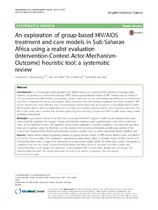An exploration of group-based HIV/AIDS treatment and care models in Sub-Saharan Africa using a realist evaluation (Intervention-Context-Actor-Mechanism- Outcome) heuristic tool: a systematic review
Date
2017Author
Mukumbang, Ferdinand C.
Van Belle, Sara
Marchal, Bruno
van Wyk, Brian
Metadata
Show full item recordAbstract
Introduction: It is increasingly acknowledged that differentiated care models hold potential to manage large
volumes of patients on antiretroviral therapy (ART). Various group-based models of ART service delivery aimed at
decongesting local health facilities, encouraging patient retention in care, and enhancing adherence to medication
have been implemented across sub-Saharan Africa. Evidence from the literature suggests that these models of ART
service delivery are more effective than corresponding facility-based care and superior to individual-based models.
Nevertheless, there is little understanding of how these care models work to achieve their intended outcomes. The
aim of this study was to review the theories explicating how and why group-based ART models work using a realist
evaluation framework.
Methods: A systematic review of the literature on group-based ART support models in sub-Saharan Africa was
conducted. We searched the Google Scholar and PubMed databases and supplemented these with a reference
chase of the identified articles. We applied a theory-driven approach—narrative synthesis—to synthesise the data.
Data were analysed using the thematic content analysis method and synthesised according to aspects of the
Intervention-Context-Actor-Mechanism-Outcome heuristic-analytic tool—a realist evaluation theory building tool.
Results: Twelve articles reporting primary studies on group-based models of ART service delivery were included in
the review. The six studies that employed a quantitative study design failed to identify aspects of the context and
mechanisms that work to trigger the outcomes of group-based models. While the other four studies that applied a
qualitative and the two using a mixed methods design identified some of the aspects of the context and
mechanisms that could trigger the outcomes of group-based ART models, these studies did not explain the
relationship(s) between the theory elements and how they interact to produce the outcome(s).

